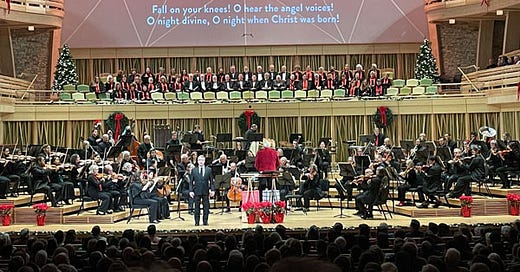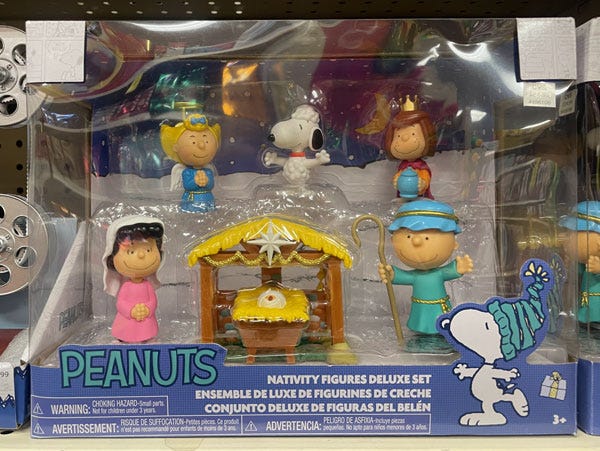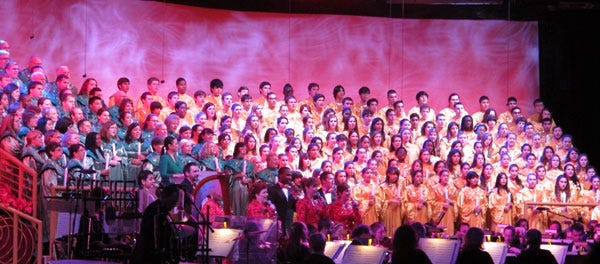Welcome to another edition of Willoughby Hills!
This newsletter explores topics like history, culture, work, urbanism, transportation, travel, agriculture, self-sufficiency, and more.
If you enjoy what you’re reading, please consider a free subscribtion to receive emails every Wednesday and Sunday plus podcast episodes every two weeks. There are also paid options, which unlock even more features.
I have been thinking about the rhythm of life a lot more lately, especially after speaking with Kim John Payne on the podcast last month. He and I discussed balancing calm days with hectic days and the need to rest and recharge at times.
My wife and kids are both on break next week and I have decided to take the last of my vacation days this year, so all four of us will be home without any major plans. We have company visiting for Christmas, but then will be spending some time just being in each other’s presence. It will be a time to cook together, read together, play games, and maybe get caught up on some household chores.
We had initially talked about doing some kind of getaway between Christmas and New Years but we ended up settling on doing nothing and being okay with that.
As such, I am also planning to take a little time away from publishing this newsletter and podcast to allow the creative juices to flow a little better in the new year. I am not planning to be in your Inboxes again until Wednesday, January 3.
2023 has been a wild year for me. For my first post of the year, I decided to rebrand this newsletter to Willoughby Hills, after initially launching during the pandemic as Quarantine Creatives. Having a new title and new focus allowed me to really stretch myself as a writer and thinker.
I explored the last remaining Sears store in New England, shared some thoughts on jam jars that were designed to have a second life as drinking glasses, and looked at how maple syrup was traditionally made before the advent of modern technology. I also took a deep dive into the history of roadside signage, which unexpectedly took me back hundreds of years in the past.
In the spring, I relaunched the podcast under the name Willoughby Hills and had some amazing new conversations. Some of my favorites included talking with Alexandra Lange about the history of shopping malls, getting agrarian with Nick Offerman, discussing repairing stuff with Sandra Goldmark, uncovering Jewish and Native American history with Rebecca Clarren, and speaking about racism and white supremacy with Saira Rao.
Over the past year, the number of subscribers to this newsletter and podcast has almost doubled! I am so grateful to those of you who read and share my work. A sincere thank you to those of you who have also upgraded to a paid subscription! Your moral support is equally as important as your monetary support.
As we head into the Christmas holiday, my mind is struck by the cognitive dissonance of celebrating a time of peace and quiet when violence continues to rage in the Middle East.
A few weeks ago, my daughter’s youth chorus was invited to perform as part of a holiday concert at our local music center, which also featured a philharmonic orchestra, an adult choir, and a few soloists.
Many of the songs were lighter Christmas fare like “Sleigh Ride” or “Santa Claus is Coming to Town.”
But one of the soloists was a local tenor singer who sang a beautiful rendition of “O Holy Night.” (It won’t be the exact same, but if you listen to Pavarotti’s version while you read this, you’ll get the gist.)
The venue where the concert was held is a newly built cavernous space made almost entirely of wood and stone. It’s also acoustically beautiful. As the tenor sang, his voice filled every bit of the air with a palpable seriousness.
Hearing a traditional song like this, I was instantly transported back to the Catholic Church pews of my childhood, thinking of the story of the birth of Jesus.
In that story, Joseph and Mary return to Joseph’s birthplace. He is now a stranger in his hometown and has nowhere to stay. The innkeeper turns them away, despite the fact that the woman is pregnant and nearly ready to give birth. The woman ends up having her baby in a manger, for she has no other choice and nowhere else to go.
The desperation of Joseph and Mary in that story felt like some of the stories we’ve been witnessing coming out of Palestine in the last two months. People desperate for help with nobody there to lend aid. Hospitals that should be a refuge being bombed.
As the song continued, I was brought to tears, realizing that not only was this story an allegory for what was happening right now, but it also happened to take place in that exact part of the world. Bethlehem, the supposed site of the birth of Christ, is located in the West Bank of Palestine, an area that is also being subjected to violence at the hands of the Israeli army.
As the singer reached the high, long notes of “Oh night divine,” I was struck with immense sadness for the people that had heard the story of Jesus’s birth countless times as children and yet didn’t apply the lessons to the current situation. It’s not just religious people either. This story gets recounted in A Charlie Brown Christmas, Pee Wee’s Christmas Special, and many other place in pop culture. People know it.
And yet stories like these seem to exist in a vacuum for so many. People have a hard time applying a story like that of Jesus in the manger to our modern times.
I am no longer a Catholic, Christian, or religious at all, but even if I no longer believe that Jesus’s birth was some divine miracle meant to save humanity, I can still see how the lessons of hospitality, acceptance, and kindness should apply today.
I don’t pray to Jesus anymore, but I still regard him as an important historical figure.
At Walt Disney World this time of year, there’s a show called Candlelight Processional where a celebrity narrator, an orchestra, and a large choir retell this same story of the birth of Christ. There is one passage of that show which the celebrity narrator reads that always gives me chills (you can listen to Phylicia Rashad recite it on the soundtrack album):
“Here is a man who was born in an obscure village, the child of a peasant woman. He grew up in another village. He worked in a carpenter shop until He was thirty. Then for three years He was an itinerant preacher.
He never owned a home. He never wrote a book. He never held an office. He never had a family. He never went to college. He never put His foot inside a big city. He never traveled two hundred miles from the place He was born. He never did one of the things that usually accompany greatness. He had no credentials but Himself.
While still a young man, the tide of popular opinion turned against him. His friends ran away. One of them denied Him. He was turned over to His enemies. He went through the mockery of a trial. He was nailed upon a cross between two thieves. While He was dying His executioners gambled for the only piece of property He had on earth, His coat. When He was dead, He was laid in a borrowed grave through the pity of a friend.
Nineteen long centuries have come and gone, and today He is a centerpiece of the human race and leader of the column of progress.
I am far within the mark when I say that all the armies that ever marched, all the navies that were ever built; all the parliaments that ever sat and all the kings that ever reigned, put together, have not affected the life of man upon this earth as powerfully as has that one solitary life.”
It’s perhaps a bit heavy handed, but it is true that there is perhaps no single figure who has had such an impact on our world over the centuries. A Jewish carpenter. Born in Palestine. More powerful than any army or navy.
Even in my more secular life now, I can’t escape the notion that this holiday happens to fall right around the winter solstice. On the darkest day of the year, there is the promise of light and life.
This Christmas may not be like the ones in years past, but I will do my best to enjoy my time with my family and to think of the people who are needlessly suffering and dying right now. I hope for peace, but I also know that real, true peace takes dedication to achieve.
Thank you all again for your continued support of this little project. Have a safe and happy holiday season and we’ll talk in 2024!
Thanks for reading Willoughby Hills! Subscribe for free to receive new posts and support my work.
Related Reading
A Cleveland Dead Mall Christmas
If you’ve missed past issues of this newsletter, they are available to read here.







